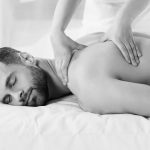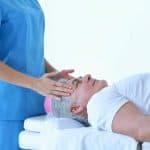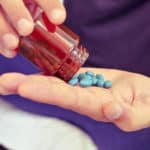When a client’s body jerks on the massage table, it is natural to be a bit alarmed. According to the individual circumstances, such body jerks can be a normal part of relaxation or they can be indicative of a significant medical problem. Because clients often receive bodywork prior to being seen by their primary care provider, it is important for massage therapists to be able to distinguish between harmless involuntary muscle contractions and pathological spasmodic jerking.
Myoclonus
Myoclonus is the medical term describing the symptom of sudden, involuntary jerking of a muscle or group of muscles. Myoclonic twitches or jerks are usually defined as belonging to one of the following two types:
- Positive myoclonus – sudden muscle contraction
- Negative myoclonus – sudden muscle relaxation
The way myoclonus presents itself can vary widely. The jerking can occur:
- Alone
- In sequence
- Infrequently
- Many times a minute
- As a response to an external event
- Following an attempt at movement
Regardless of it being positive or negative, isolated or sequential, frequent or infrequent or what event precedes it, myoclonic spasms are always involuntary.
Myoclonus Origins
Being able to identify the cause of a muscle jerk helps practitioners decide if their client might require a physician referral. Such evaluation requires deliberation, because there are many possible causes of myoclonus and scientists are not entirely sure of why they occur. The basics of myoclonus dictate that it is simply a muscle twitch followed by relaxation. In general, the following types of myoclonic movements (without additional symptoms) are harmless:
- Hiccups – This spasm of the diaphragm is an example of positive myoclonus.
- Sleep starts – Jerks typical of falling asleep. Common in a relaxation-based massage session, this is an example of non-pathological, negative myoclonus.
However, regular muscle jerks that progressively intensify require attention by a physician. Severe cases of myoclonus can distort movement and severely limit a person’s ability to eat, talk or walk.
Although some cases of myoclonus are caused by an injury to the peripheral nervous system, most are caused by a disturbance of the central nervous system. Even though the specific mechanisms are not yet fully understood, scientists believe that an over-excitability of the brain’s motor pathways is responsible for myoclonic jerks.
Frequent and persistent myoclonus can indicate a wide variety of nervous system disorders including epilepsy, multiple sclerosis, Parkinson’s disease, Alzheimer’s disease or Creutzfeldt-Jakob disease. In addition, physicians evaluating persistent myoclonus must rule out:
- Head or spinal cord injury or infections
- Strokes
- Brain tumors
- Kidney or liver failure
- Chemical or drug poisoning
- Prolonged oxygen deprivation
- Metabolic problems
Not a Muscle Spasm
At first glance, involuntary muscular jerking may seem synonymous with a muscle spasm. However, these two events have different origins, with myoclonus being neurological and muscle spasms being muscular. While myoclonic jerks can be disturbing, they do not cause pain. On the other hand, muscle spasms are typically a result of soft tissue injury and are usually painful.
When massage therapists witness their client twitching, they may want to pay closer attention to this symptom. Upon ruling out muscle spasms and harmless myoclonic twitches, it may be appropriate for the therapist to inquire further about his/her client’s spasmodic movements. A referral is definitely called for if the client has not been seen by his/her doctor for increasingly frequent and severe myoclonus. By advising clients in this situation to be evaluated for myoclonus, bodyworkers demonstrate their knowledge about this physiological phenomenon and their commitment to looking out for their clients’ best interests.
Recommended Study:
Advanced Anatomy and Pathology
Advanced Anatomy and Physiology
References:
Chaitow, Leon, Peter Baldry, Jan Dommerholt, Fibromyalgia Syndrome: A Practitioner’s Guide to Treatment, Elsevier Health Sciences, 2003: 280.
http://www.holistic-online.com/REMEDIES/Sleep/sleep_nocturnal-myoclonus.htm, Nocturnal Myoclonus, Retrieved September 15, 2008, ICBS, Inc., 2008.
http://www.mayoclinic.com/health/myoclonus/DS00754, Myoclonus, Retrieved September 15, 2008, Mayo Foundation for Medical Education and Research, 2008.
http://www.ninds.nih.gov/disorders/myoclonus/detail_myoclonus.htm, Myoclonus Fact Sheet, Retrieved September 15, 2008, National Institute of Neurological Disorders and Stroke, 2008.















